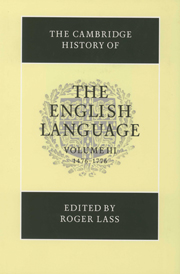1 - INTRODUCTION
Published online by Cambridge University Press: 28 March 2008
Summary
The setting
This volume treats the history of English from the late fifteenth to the late eighteenth century; the dates are at least partly symbolic, framing the establishment of Caxton's first press in England and the American Declaration of Independence, the notional birth of the first (non-insular) extraterritorial English. The preceding volume covered a slightly longer time-span (four centuries as opposed to three), but in our period the changes in the cultural ambience in which English existed and which its speakers expressed were arguably more profound, perhaps greater even than those from the murky ‘beginnings’ of volume I to the Norman Conquest; even perhaps than those in the millennium from the fifth to the fifteenth century.
Taking conventional period names as a rough index of change, the three centuries covered here include ‘the waning of the Middle Ages’ (Huizinga 1927), the Renaissance, the Reformation, the Enlightenment and the beginnings of the Romantic period. The transformation of the European world-picture in this time is enormous. Fifteenth-century Europe was still essentially medieval, living in a geocentric and finite cosmos, the fixed stars bounding the universe beyond the crystalline planetary spheres. No celestial objects invisible to the naked eye were known, nor, at the other extreme, any organisms or structures smaller than the naked eye could see. In the natural world, maggots generated spontaneously from rotten meat, the heart was the seat of the emotions, and the arteries carried air.
Less than two centuries on, much of this had become what C. S. Lewis (1964) aptly called ‘the discarded image’.
- Type
- Chapter
- Information
- The Cambridge History of the English Language , pp. 1 - 12Publisher: Cambridge University PressPrint publication year: 2000
References
- 2
- Cited by



